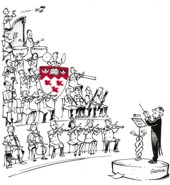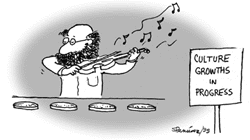|
 |
| Fascinatin’ Rhythm: How auditory and motor regions of the brain work together |
|
|
4/21/2013
|
25th Lecture on the Biology of Music
I Medici's Concert-Lecture April 21, 2013

Virgina Penhune, PhD
Associate Professor, Department of Psychology, Concordia University, Montreal, QC
(biography)
Fascinatin’ Rhythm: How auditory and motor regions of the brain work together
Abstract
Music is a complex system of auditory communication found in all human societies. Musical structures of all kinds, from an Indian rag to a Bach fugue, are complex, rule-based systems. The perception of musical structure arises from two basic features: melody and rhythm. Melody is perhaps the most obvious, but music relies on rhythm as a vital part of its power to communicate. Perceiving musical rhythm requires structuring sounds in time. Producing musical rhythms requires the timing, coordination and sequencing of motor actions – the vocal chords, lips and tongue for singing; the fingers, hands and arms for playing an instrument, or the entire body for dance. This lecture will describe the brain mechanisms important for both rhythm perception and production, and discuss how musical rhythm links the auditory and motor regions of the brain.
|
ALP
3/24/2013 3:07:34 PM
Δ:ALP
4/2/2013 2:08:48 AM
|
|
|
April 2013
| S |
M |
T |
W |
Th |
F |
Sa |
|
1 |
2 |
3 |
4 |
5 |
6 |
| 7 |
8 |
9 |
10 |
11 |
12 |
13 |
| 14 |
15 |
16 |
17 |
18 |
19 |
20 |
| 21 |
22 |
23 |
24 |
25 |
26 |
27 |
| 28 |
29 |
30 |
|

|





